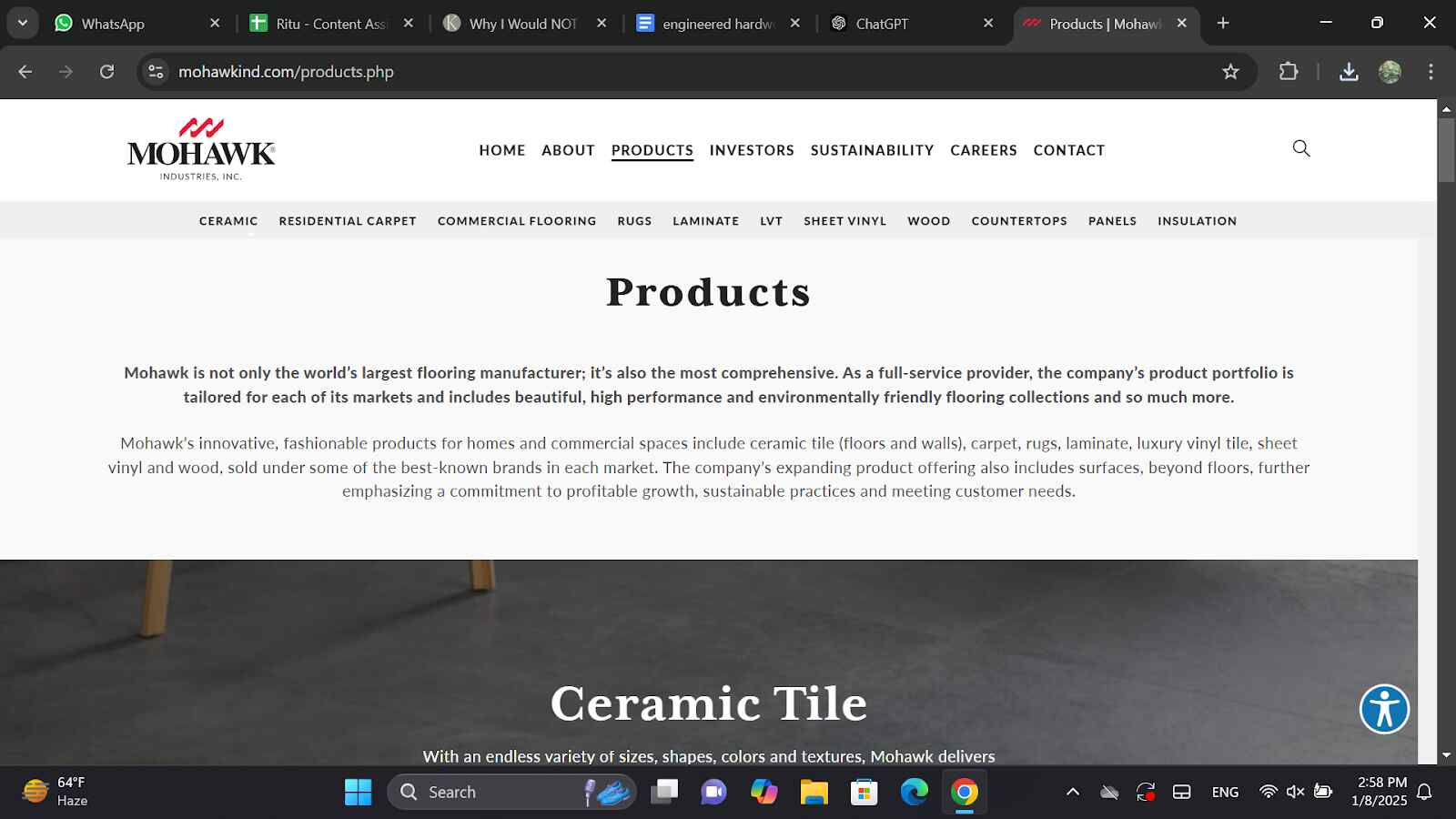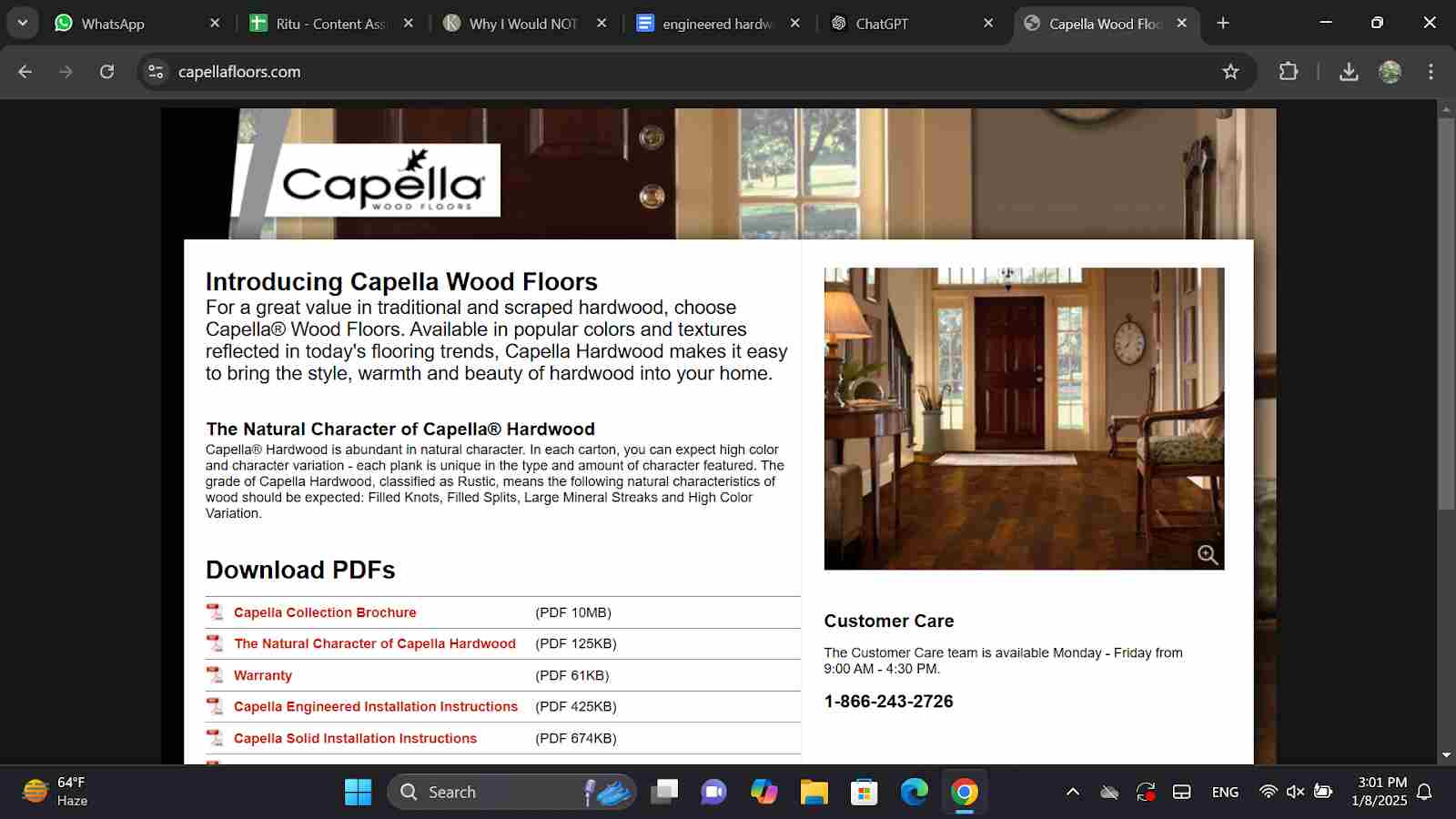This blog will guide you on the Engineered Hardwood Flooring Brand to Avoid for your new flooring
Engineered hardwood flooring is a fantastic way to bring warmth and style into your home. But before you take the plunge, let me share something crucial.
Not all flooring brands are created equal, and choosing the wrong one could lead to headaches and unexpected costs later on. Stick with me, and I’ll take you through the brands you might want to avoid and how to spot red flags before making a purchase.
Why Avoid Low-Quality Engineered Hardwood Flooring Brands
Opting for low-quality engineered hardwood flooring can lead to many problems.
I’ll be honest—choosing engineered hardwood flooring wasn’t a decision I took lightly. I wanted to add warmth and style to my home, and after considering a lot of options, I settled on TrafficMaster, a brand that seemed like a good choice because of its affordable price.
But oh, was I wrong!
From the moment the flooring was installed, I noticed problems. The surface began to scratch and dent easily. It wasn’t long before I realized that the veneer just wasn’t built for the daily life of a busy household.
What made things worse was dealing with customer service. After reaching out multiple times to report the issues, I found their responses to be frustratingly slow and unhelpful. I was left feeling like I was getting the runaround. No solutions, no action.
In the end, I was forced to replace a significant portion of the flooring much earlier than anticipated. Not only did this result in unexpected costs, but it also left me feeling disappointed in the brand. It felt like a waste of money and time, especially when I thought I was getting a good deal initially.
You’ve also probably heard stories about floors that warp, peel, or scratch too easily. Unfortunately, I have experienced it. They happen all too often when people choose low-quality brands. Let’s make sure you don’t end up there.
10 Engineered Hardwood Flooring Brands to Avoid
Here’s a list of some brands that have received less-than-stellar feedback. I’ll explain why they’ve raised eyebrows and why you might want to steer clear.
1. Lumber Liquidators (now LL Flooring)
Lumber Liquidators has had a history of issues, including concerns about harmful chemicals like formaldehyde in some of their products. Their engineered hardwood often has thin wear layers, making it less durable for everyday use.
Many customers report uneven finishes and a lack of consistency in product quality. You can easily be tempted by the affordable prices, but the hidden costs of replacements and repairs aren’t worth it.
Why Avoid It: While they’ve made efforts to improve, their reputation for cutting corners on quality still lingers. Many homeowners have experienced durability issues, and their customer service isn’t always helpful when problems arise.
2. Home Depot’s TrafficMaster Engineered Hardwood
TrafficMaster is marketed as an affordable option, but it falls short of durability like the LL Flooring brand. The thin veneers are prone to scratches and dents, and the flooring doesn’t hold up well in humid or moist environments.
Customers have also complained about warping and buckling over time. If you’re looking for something that will stand the test of time, you might want to skip this brand.
Why Avoid It: It’s tempting because it’s affordable, but you get what you pay for. TrafficMaster floors are better suited for low-traffic spaces, and even then, they don’t last as long as more premium options.
3. BellaWood (Sold by LL Flooring)
BellaWood is advertised as a premium brand, but many users report peeling and chipping veneer within months of installation. The flooring can be challenging to install, which might lead to additional costs if you need professional help.
While it has a high-end price, the quality doesn’t always match, leaving many homeowners disappointed. Additionally, the warranty process has been criticized for being difficult to navigate. If you’re paying for a premium product, you deserve better reliability.
Why Avoid It: BellaWood markets itself as high-end, but its engineered hardwood doesn’t always deliver. Many people have complained about durability, which defeats the purpose of investing in engineered wood.
4. Nuvelle
Nuvelle’s engineered hardwood often has thin top layers that scratch and dent easily, making it unsuitable for your busy households. The flooring is also prone to warping and separating in areas with high humidity.
Customers frequently mention inconsistencies in the product quality, even within the same batch. These issues can lead you to frustration and unexpected repair costs like the Bellawood Flooring. For a similar price, there are better brands with proven durability and performance.
Why Avoid It: This brand might seem like a good middle-of-the-road option, but the frequent reports of damage and wear make it hard to recommend.
5. Kronotex
Kronotex may be budget-friendly for you, but it comes with significant trade-offs in quality. Many homeowners complain about scratches, dents, and poor resistance to everyday wear and tear.
The locking mechanisms can be tricky, making your flooring installation more difficult than expected. Additionally, the finishes often appear uneven or inconsistent once installed. If you want flooring that lasts, Kronotex might not meet your expectations.
Why Avoid It: Known for budget-friendly options, Kronotex sacrifices durability. If you’re looking for a floor that lasts, this one might not cut.
6. Bruce Hardfloor Flooring(Certain Lines)
Bruce is a well-known brand, but not all of its products deliver the same level of quality. Some of the budget-friendly lines have issues like peeling veneer and poor resistance to scratches like the Nuvelle Flooring Brand.
While the brand’s premium options are reliable, the cheaper lines may leave you disappointed. Make sure to research the specific product line before making a purchase.
Why Avoid It: While Bruce’s premium products are reliable, their lower-end lines have left many homeowners disappointed.
7. Mohawk (Budget Lines)
Mohawk is a trusted name in flooring, but its budget-engineered hardwood lines often fall short. Some customers also report quality inconsistencies between batches, making it harder to plan a cohesive look.
While Mohawk’s premium products are excellent, their lower-priced options might not meet your expectations. Spend a little extra for a better-quality product if you’re considering this brand.
Why Avoid It: Like Bruce, Mohawk’s budget-friendly options are where most complaints arise. Stick to their higher-end products if you’re considering this brand.
8. Home Depot’s In-House Brands (LifeProof)
You should avoid Home Depot’s in-house brand, LifeProof, for engineered hardwood flooring due to its lack of long-term durability. While it may seem like an affordable option, LifeProof floors often have thin wear layers that scratch and dent easily, which means they won’t hold up well in high-traffic areas.
There are also reports of warping and buckling in humid environments, which makes it unreliable formoisture-prone spaces. Overall, while it might seem like a good deal initially, you’ll likely face costly repairs or replacements in the future.
Why Avoid It: While LifeProof might appear budget-friendly upfront, its tendency to require frequent repairs or replacements ends up making it more expensive in the long run.
9. Capella
Capella’s engineered hardwood has been reported to peel, bubble, or chip in high-traffic areas. Many users have struggled with warranty claims, as customer service is often unresponsive.
While it might look good initially, the flooring’s lack of durability can lead to frequent replacements. These issues make it hard to recommend Capella as a reliable option. Investing in a more dependable and serviceable brand can save you time and money in the long run.
Why Avoid It: Capella’s engineered wood products often fall short of expectations, especially in areas with fluctuating humidity.
10. Robina Floors
Robina Floors is known for delamination and weak adhesive layers, which cause the flooring to come apart over time. The surface scratches easily, even in low-traffic spaces, making it unsuitable for busy homes.
Many customers have also noted poor durability in humid environments like the Home Depot’s In-House Brands. While it might be a budget-friendly choice for you, the frequent repairs and replacements can add up. Choosing a more durable brand is a better option if you want long-term satisfaction.
Why Avoid It: While it may be a lesser-known brand, the issues reported by homeowners make it a risky choice.
Red Flags to Look While Choosing Engineered Hardwood Flooring Brands
How can you spot a problematic brand before it’s too late?
Here are some tips:
- Too-Good-To-Be-True Prices: If the price is significantly lower than competitors, it’s likely because corners were cut.
- Thin Wear Layers: Look for a wear layer of at least 2mm. Anything thinner means you can’t refinish the floor if it wears out.
- Short Warranties: A warranty shorter than 10 years is a red flag. You should look for reliable brands that offer longer, more comprehensive warranties.
- Lack of Reviews or Mixed Feedback: If a brand has little to no customer feedback or any complaints, you should proceed with caution.
- Inconsistent Quality Reports: Look for patterns in reviews. If several people have reported uneven finishes or durability issues, then it’s a bad sign.
Reliable Engineered Hardwood Brands to Consider
Now that we’ve covered what to avoid, let’s talk about some trusted names. These brands are known for their quality and reliability:
1. Mirage
If you’re looking for quality that truly lasts, Mirage is a brand to consider. Their finishes are top-notch, and the wear layers are built to stand the test of time.
People love how their floors stay beautiful and durable for years. If you want flooring that’s both high-end and long-lasting, this brand should be on your radar.
2. Anderson Tuftex
Anderson Tuftex has some gorgeous options that combine style and durability.
Whether you’re after a traditional or contemporary look, they’ve got something that will suit your space. If you want a flooring brand that’s reliable and delivers great value, Anderson Tuftex is worth checking out.
3. Provenza
If you’re after unique and high-quality finishes, Provenza is a brand that’s hard to beat.
Their products are known for their beautiful designs and exceptional durability. The wide range of finishes they offer ensures you’ll find something that matches your style.
4. Shaw Floors (Premium Lines)
Shaw Floors offers a great selection of premium lines that are well-regarded for their durability and aesthetic appeal.
Whether you’re looking for something classic or modern, Shaw delivers reliable options that will last. With Shaw, you’re getting a solid product that offers both beauty and function without breaking the bank.
5. Newton
Though newer to the scene, Newton has been quickly gaining a reputation for offering high-quality, budget-friendly engineered hardwood.
If you’re looking for a good deal without sacrificing quality, Newton could be a great choice. They’re a brand to watch as they continue to grow in popularity among homeowners.
Wrapping It Up!
Choosing engineered hardwood flooring can be overwhelming, but it doesn’t have to be. By steering clear of brands with known issues and keeping an eye out for red flags, you’re setting yourself up for success. And remember, investing in quality now will save you money and stress in the long run.
If you’re ever unsure, reach out. I’m happy to help you weigh your options and make the best choice for your home. After all, your floors are something you’ll live with every day. Let’s make sure they’re something you’ve dreamed of and more.



















